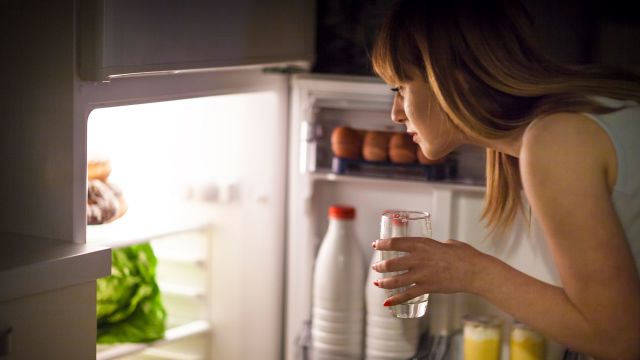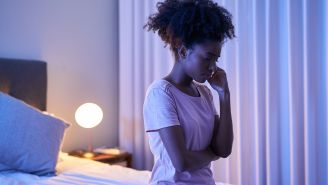Updated on July 1, 2022.
One of the main casualties of our always-on, push-notified, binge-watching world is sleep. What’s worrisome is that we may not realize just how much our poor sleep is hurting us.
As Michael F. Roizen, MD, and Michael Crupain, MD, MPH, explain in their book, What to Eat When, people don’t often place poor sleep in the same health-damaging category as cigarette smoking or obesity. That's because fatigue seems to lurk behind the scenes rather than influence our health head-on.
In reality, chronic sleep deprivation has a steady, creeping effect on our bodies, and the issues associated with lack of sleep—including immune problems, memory issues, higher stress levels, obesity, and increased risks of heart disease and diabetes—are significant.
In this excerpt from What to Eat When, Drs. Roizen and Crupain explain how smart nutrition can play a role in supporting the cellular repair that occurs while we sleep, rebuilding muscle tissue, strengthening brain cells, and putting the brakes on excessive inflammation.
What to eat when you cannot sleep
You’ve heard it all before.
Get more sleep. Sleep eight hours. Easier said than done, especially if you have a complex cocktail of problems that make it difficult to sleep, such as pain, hormonal issues, obesity, urge to urinate and so many other things that can disrupt sleep cycles.
Like many other health issues, sleep is one in which you may need to consider lifestyle and medical tactics to determine what will work best for you. But you can also use food and nutrients to ease into some possible solutions to help change your verbs from “tossing and turning” to “sweet dreaming.” (As long as that sweet dreaming doesn’t actually include sweets!)
Your MVP foods for quality sleep
No magic sleep-inducing piece of fruit or secret ingredient will induce drowsiness—though, as you’ll see in the following, some are better than others. But setting yourself up with a good last meal of the day can help prepare your body for sleep.
Research shows that having meals high in fiber and low in saturated fat and simple carbs (sugar) should help. So that’s why a dish like beans, grilled fish or chicken, and a large side of vegetables is the best meal choice to help your body prepare to shut down. And, as we’ve learned, the earlier in the evening you eat it, the better.
One study published in January 2016 in the Journal of Clinical Sleep Medicine found that this kind of meal was associated with people falling asleep faster—in less than 20 minutes, in fact. When subjects consumed more saturated fat and sugar, the process took closer to 30 minutes. If you have the choice (and you do!), make your protein fish, which, when eaten regularly, has been linked to helping prevent poor sleep.
Key players to assist with sleep
The two nutrients most associated with better sleep are magnesium and tryptophan.
You’ve heard of tryptophan. It’s all over headlines in late November as the reason why you want to zonk out after eating a big plate of Thanksgiving turkey. Although tryptophan may not actually make you tired after a big holiday meal, the foods that contain it, or magnesium, are certainly good options if you’re trying to improve your sleep quality.
Tryptophan is an amino acid that converts to the body clock-regulating hormone melatonin. Foods that contain it include egg whites, soybeans, chicken, and pumpkin seeds. And when you choose your vegetables for dinner, consider leafy greens like spinach that contain magnesium.
Sleep opponents to cut from your diet
Feeling cravings at night? Don’t be tempted by a midnight snack. Research on circadian rhythm and eating cycles reveals that midnight is actually the worst time to eat—even if you think you just need a little something to make yourself more comfortable. Instead, have a fiber-rich dessert before the sun sets—for example, a big bowl of berries or a pear. The fiber will slow things down so you feel full longer and thus less likely to crave something later at night.
Food substitutes for better snoozing
When you don’t get enough sleep, you feel fatigued. When you feel fatigued, your body wants to raise energy levels, so it reaches for the fastest solution: sugar. When you reach for sugar, you gobble up stacks of cookies. And when you do that day after day after day, you gain weight.
Aside from cutting back on sugary treats and refined carbs, try these smart food swaps to help boost energy all day long and foster better Zzzzs—without adding extra calories.
- Sub out: Caffeine less than six hours before bed
- Sub in: Water with a squeeze of lemon or lime juice
- Sub out: Large meals within four or five hours of bedtime
- Sub in: Larger meals as your first or second meal of the day
- Sub out: After-dinner sugar bombs
- Sub in: Kiwi fruit and tart cherry juice. Both have been shown to help improve sleep. Tart cherry juice may help improve levels of melatonin, a hormone that induces sleep.
Excerpted from the book What to Eat When: A Strategic Plan to Improve Your Health and Life Through Food, by Michael F. Roizen, MD, and Michael Crupain, MD, MPH. Copyright © 2019 by Michael F. Roizen, MD, and Michael Crupain, MD, MPH. Reprinted by permission from National Geographic.






